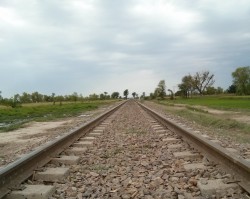Editorial | May 13th, 2015

We’ve had two close calls with train derailments in North Dakota, with Casselton and now Heimdal. How long are we going to wait before those close calls become a tragedy? The problem is this, many years into the oil boom, infrastructure hasn’t caught up to production. But there’s no excuse for why it’s not happening any longer. Industry points the finger at state and federal officials and vice versa. It doesn’t matter who’s to blame, everyone’s responsible. Get it done.
Last week, we wrote about how ND for the third year in a row is the leading state for workplace deaths in America. The most alarming statistic is that workplace deaths are seven times the national average in the oil and gas industry, largely accounting for why ND is at the top of the list. When we asked oil industry officials for the response to the report, they mentioned how half the causes of death were related to transportation and point to the need for increased infrastructure.
Frankly, we don’t care what the causes are. We care that ND is leading the nation again for something we should be ashamed of. We shouldn’t have this many deaths this many years into the oil boom. We’ve had many years now and many dollars thrown in our coffers to fix and expand the roads that are hauling the state’s treasure chests of natural resources. Why is it taking so long? What is the hold up? When will someone step up and say enough is enough, that we no longer want to make national news for oil tank cars blowing up outside our towns and for our workers dying at seven times the national average?
Frankly, we’re lucky no one has been severely injured in the derailments that have happened so far. What if they happened in the middle of Fargo? Would we be so lucky? The industry that participates in this transport of both oil and gas as well as the rail industry, for all their talk about wanting safer standards, fights regulations when they feel they are too strict. When they have a choice between something that costs them more money and safety, they will too often choose saving a buck. That’s why we have government standards and regulations.
An industry that polices itself won’t be effective. North Dakota state officials have a system of regulation that is a defacto form of policing itself that has been documented many times over in the NY Times and elsewhere. It’s not working. Slaps on the wrist, reduced fines and penalties for violators as long as they clean up their mess or say they are for safety are no motivation to get better and improve things. Our state regulators philosophy of working cooperatively with industry officials to regulate and police them has failed miserably. They need to decide if they are on the side of our workers and the residents of these smalls towns where as many as nine rail unit trains carrying oil pass through every day.
Mere days after the Heimdal derailment, we have learned the oil industry’s lobbying group in Washington DC, the American Petroleum Institute, will be fighting tooth and nail stricter federal standards which would rapidly phase-out old tank cars that are unsafe during derailments. They have filed petition in federal court to block the strictest portions of the regulations saying they are too expensive and not feasible. We ask what is safety worth?
The oil industry is making money hand over fist as is the rail industry transporting that oil. They can afford to make the improvement to make transporting the oil safe through our communities. And if they can’t afford it (which we don’t buy), then don’t transport the oil. The main focus should not be the cost of these provisions; it should be the safety of transporting this oil, no matter the cost. We need to do whatever it costs to make sure oil trains aren’t exploding in our cities. It’s a reality and fact of life that many of these trains will be coming through our town. Reports are that 60 percent of Bakken crude is transported via rail. OK fine, then what are we doing to make it safe?
Who is inspecting these rail cars to make sure they are up to standard and not currently transporting oil unsafely? If standards aren’t up to par, we need to rush changes in regulations so that new tank cars are on the rails as soon as possible and we need to make sure that requirements in oil volatility levels for travel are at the safest levels possible. Maybe even if the changes we’ve done and implemented so far don’t go far enough. There are reports that the volatility of the oil in the Heimdal derailment met new standards for safe transport. Maybe we need to lower that level.
It’s well past time for everyone involved to make statements about what needs to change and throw their arms up in the air in anger after something tragic occurs. We’ve had plenty of time and warning signs to improve infrastructure and make things better. We’ve had two Legislative sessions now where we’ve known the effects of the oil boom. If we couldn’t use the tremendous financial advantages of the boom to improve worker safety and rail transport of oil during those sessions, knowing full well the effects of not doing so, then we have failed.
It’s long past time to argue minute details over changes and throw up roadblocks. Make things safe now before we all regret the results.
February 16th 2026
January 15th 2026
December 18th 2025
November 18th 2025
October 15th 2025
__293px-wide.png)


_(1)_(1)_(1)_(1)_(1)__293px-wide.jpg)
_(1)_(1)_(1)_(1)_(1)__293px-wide.jpg)
_(1)__293px-wide.jpg)